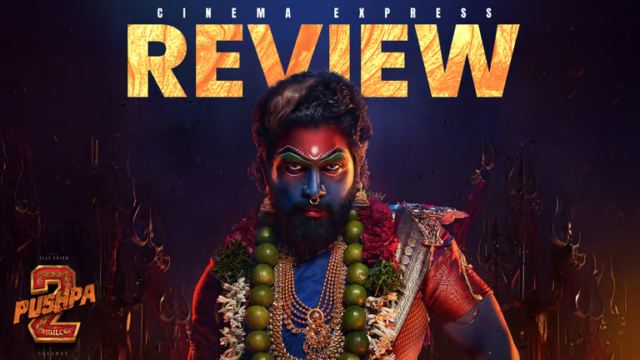With Pushpa: The Rule, Sukumar crafts a sequel that’s as audacious as its protagonist, brimming with wild energy and unforgettable visuals. Yet, beneath the swagger and spectacle lies a film grappling with uneven writing and an ending that falters
Pushpa 2: The Rule(3 / 5)
Why do we like Pushparaj?
He doesn’t care to look conventionally attractive. His shoulders are lop-sided, his hair unkempt, his speech brimming with contempt. His work? Smuggling red sanders. His retribution? A fierce defiance of systematic oppression, making him a figure of political utility. And his manner of retribution? Ruthless. As he says, he kills “without mercy.” In this sequel, Pushpa seems almost possessed, his machete slicing through limbs as though they were branches from a tree.
Yet, beneath the raw, violent exterior, Pushpa 2: The Rule reminds us of the man’s humanity. In Shreya Ghoshal’s ‘Sooseki’, Srivalli speaks tenderly of Pushpa’s kindness, likening him to a child—gentle and loyal to those he loves. And we see this tenderness too. These glimpses into his heart add layers to his character, but what makes Pushparaj so magnetic isn’t just his complexity—it’s his authenticity. Pushpa has no patience for pretense, diplomacy, or double-speak. He is, in every sense, the man everyone wishes they could consistently be.
Director: Sukumar
Cast: Allu Arjun, Rashmika Mandanna, Fahadh Faasil
Sukumar tests this authenticity in a deliciously tense premise: Will Pushpa apologise? In this no-win scenario, apologising might seem like the only reasonable course of action, but it would also shatter everything Pushpa stands for. Sukumar revels in the moment, building suspense with every beat (he does this with the Chief Minister meeting portion too). Fahadh Faasil’s Shekhawat opens the sequence with a cheeky callback: “Party undhi Pushpa,” likening his wait for an apology to pining for a girl’s response decades ago. Sukumar takes his time, heightening the tension until the sequence crescendos into a striking moment of introspection. Pushpa, staring into a mirror, asks himself the hardest question: Has power and wealth transformed him into those he once despised?
Such moments of self-reflection are rare in mass cinema, yet Sukumar weaves them effortlessly into a narrative brimming with energy and spectacle. This is a film that pulses with thought, even as it revels in wild action and audacious visuals.
Take Srivalli, for instance. While she felt underdeveloped in the first film, here she benefits from sharper writing—at least initially. Sukumar flips traditional gender dynamics, giving her agency in scenes where she pretty much drags Pushpa into the bedroom (“peelings”) or where he caresses her feet before brushing his beard in his signature gesture—with her foot. Allu Arjun later takes this subversion further, transforming into a goddess of vengeance, swinging his pallu with fury as he crushes his enemies. There’s something immensely powerful about a star embracing such sequences, challenging traditional notions of masculinity in action cinema.
Yet, despite all this unforgettable subversive energy, the film bizarrely, meekly conforms to dated portrayal of women—in a way that Pushparaj himself would be really disappointed with. Srivalli’s initial spark quickly fades, as she gets reduced to an eager cheerleader (that monologue is nevertheless a great moment for Rashmika Mandanna). The camera’s eager gaze sexualises her at every opportunity, relishing every opportunity to show us skin. Women in star-vehicles often get slotted into three roles: of victim, sex goddess, or dutiful supporter. In lesser cinema, you’d understand that they probably didn’t know any better. But here, in this film bursting with sharp, deep ideas, it’s disappointing. While on the topic of feeling let down, I didn’t quite understand the utility of the whole Japan sequence in the beginning. I think the film deserved a far superior end (not so much the destination as the road it takes to get there). I also struggled to understand the sudden infusions of strangely melodramatic music that seems to, again, belong in lesser quality cinema. Also, perhaps the Shekhawat-Pushpa duels feel a bit too one-sided in the latter’s favour.
But. Pushpa 2: The Rule offers plenty to savour. Allu Arjun once again inhabits Pushpa with astonishing ease, turning even audacious moments—like transforming into a goddess—into iconic sequences. Sukumar conjures unforgettable visuals: a helicopter carrying a sofa, a shot pulling back from policemen to Pushpa’s gang hauling sacks of cash, or Pushpa lifting the pallu of his saree mid-fight. The film shows such taste in reimagining elements from the first instalment, like ‘Thaggedhe le’ and Pushpa’s beard-stroking gesture.
The dialogues remain razor-sharp, with lines like, “What’s more nightmarish than the truth?” or Shekhawat’s chilling realisation: “You can kill people without killing them.” Sukumar’s taste for music and staging is, as always, such a pleasure. Songs echo through the narrative even before they officially arrive, as in Shekhawat’s murmurs of “Pushpa Pushpa.” The Gango Renuka Thalli fight sequence carries a rhythmic intensity that almost feels like music. There’s even a hymn-like feeling about Pushpa and gang throwing a challenge to Shekhawat around interval point. It’s entirely understandable that Shekhawat hums this tune for a long time after.
Even if its flaws are evident, the film’s energy rarely sags. Sure, the ending feels off, especially given that much of the film leans more into political intrigue and grand scale than into Pushpa’s familial relationships. Even so, it’s an achievement that the Pushpa universe remains compelling after more than six hours across two films. The Pushpa we see now is a far cry from the Pushpa we were introduced to. He now has power, wealth, and love—and so much to lose. Can he remain authentic, or will the world bend him?
As the franchise moves forward, here’s hoping the women are afforded the same depth as Pushpa himself. Why confine them to one-dimensional roles in a world otherwise so full of thought and sensitivity? After all, as Pushpa himself says, “Pedhdhaga alochinchaali”—think big.









